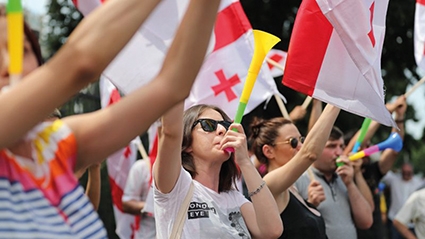The Protests and the Zero Barrier
Op-Ed
Political crisis continues. Despite winning some concessions, the demands of protesting students for the resignation of the Interior Minister remains unchanged. The compromises offered by the government are truly epic, only the fact that the parliamentary elections will be held with a proportional system for instance is worth so much. However, this didn’t prove enough for the youth and the Georgian Dream found itself in an even worse crisis. The reason for it is the so-called zero-barrier, which in the end didn’t turn out to be zero afterall.
And so the issue of zero-barrier became the reason of contradictory assesments from politicians and experts. Some believe it to be a step forward, while others argue that it is a trap, aimed at getting various extremist, pro-Russian and GD’s satellite people into the Parliament.
After the informal governor of the country announced the zero-barrier for the parliamentary elections of 2020, everyone, whether politician or not, remembered the story of 30 years ago, when the barrier of 2 % resulted in a total of 24 political parties entering the parliament.
In the distant era two decades ago, in 1992, 2,592,117 voters elected 75 MPs through the majoritarian system and 150 proportionally. It shouldn’t be hard to imagine what will happen in the conditions of a 0 % barrier, especially when we need to elect 150 MPs. Where from or why did the zero barrier emerge, when nobody asked for it? What is the trap that Bidzina Ivanishvili is tring to form against his political oponents? Some experts believe that this way, Georgian Dream will try to create a new majority. While this could be true to some extent, there are experts who don’t find this perspective alarming and on the contrary, argue that it will aid “natural selection” of the current political spectrum. As a result, we could see parties in parliament that do have some trust and rating from the population.
In itself switching to the proportional system is good, but for now it seems that the consultations and debates around it won’t pass withut noise and hassle. The situation could become even more complicated when Georgian Dream decides to ban the creation of political blocks prior to the elections and therefore create a dilemma for numerous relatively small parties that used to create an alliance and enter the legislative system this way.
If they will be deprived of this, they will need either to self-liquidate or unite under a single new party, or at least continue playing on the political arena under the status of non-parliamentary parties. It is hard to fortell, which way they will choose to go, but there is a fair chance that the united opposition will transform into a party. However, let’s wait and see what strategy will the united opposition choose for their battle against the Georgian Dream.
With the new rules assigned, in order to get into the parliament, a party will need to obtain 0.7 % which is about 14,000 votes. If we consider the results of presidential elections of 2016, the ruling party got 38%, United National movement 37% and European Georgia 10%. This means that there are only 12 mandates left to distribute, for which the minor parties will need to fight.
So where is the trap? Political expert Vakhtang Dzaboradze believes that the trick is not in “buying” the parties, but in distributing these 12 places which will be crucial during the formation of the government: “If the Dream has to buy votes for other parties, why would they do it? They would buy votes for themselves. The trap is different. The Dream needs this not because it buys votes for other parties, but because it will get the highest percent and the right to comprise a coalitional government.”
Although this argument could have some logic in it, if we calculate that 14,000 votes is 4 to 5 bulletins on each polling station, and if we add Ivanishvili’s financial resources to it, we will see that the Dream shouldn’t have a problem to create a few “fake” parties and win the electoral marathon of 2020. If he pays 100 GEL for each vote, winning the elections will cost the billionaire just 6 million USD. It shouldn’t be hard to understand why Ivanishvili decided to lower the barrier to 0%. It is also easy to understand why the students continue protesting in front of the parliament. The leaders of the protests are honest when they say that each day of protests costs the Georgian Dream its rating.
It has been two weeks already that the Dream is in the mode of self-explanation and it doesn’t seem to be changing soon. If all continues as it is, it is unlikely that the party will get the 38% that it got in the last elections. Hence, either the Minister of Interior Affairs or the Party’s ratings – it is after the Dream to decide which one to choose. By the way, better later than never, Salome Zurabishvili responded stated being ready to get engaged in the consulations around the ongoing issues. In any case, the future elections will take place by the proportional system, the 0% barrier will be in force only in 2020 and most probably be forgotten afterwards.
By Zaza Jgarkava












